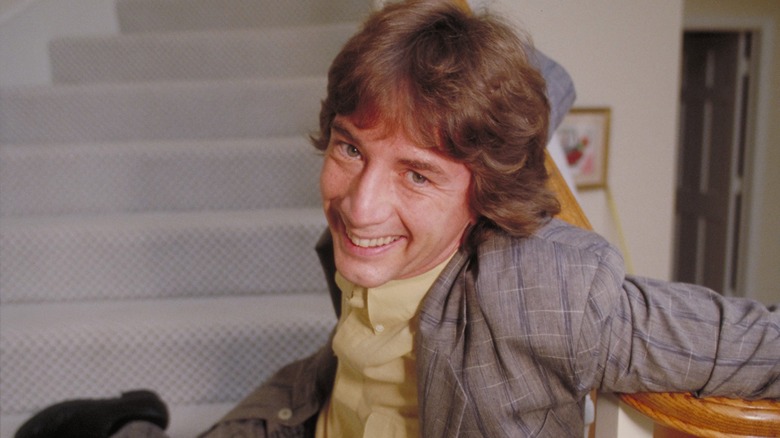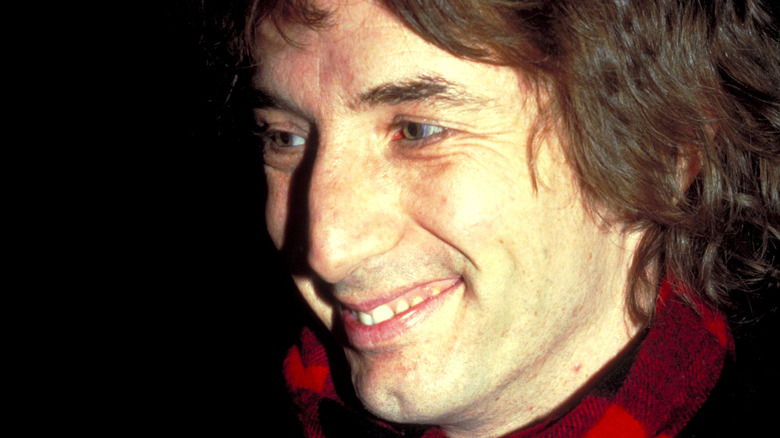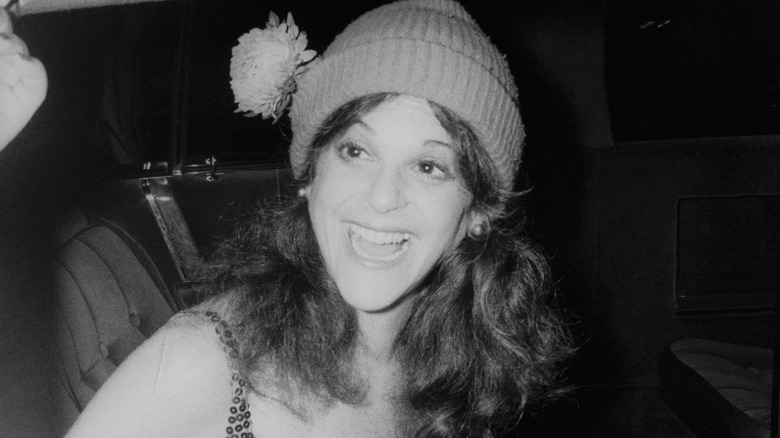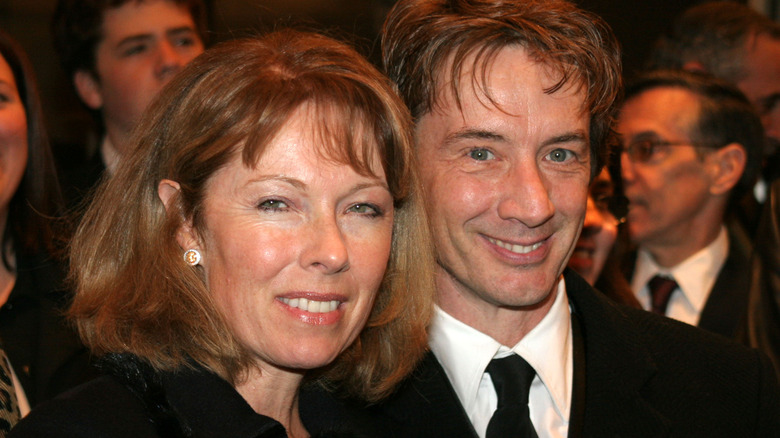Tragic Details About Martin Short
Comedy is oftentimes cruel: It's a sad observation on human nature to realize that sometimes, what people want more than anything else is to laugh at someone else. Still, every so often there's a shining beacon of cruelty-free funny, and that's Martin Short, a.k.a. the "My Little Buttercup" guy.
Vanity Fair called him Hollywood's "funniest, nicest, best of them all." Everyone agrees; Larry David — who knows pretty much everyone in Hollywood — says, "I've never heard a bad word said about him. That's a hard thing for a comedian to pull off." That's what makes it almost hard to believe that his life wasn't always smooth sailing and that he's been dealt some heartbreaking tragedies that are enough to break most people. But that said, it's entirely possible that those difficulties shaped the way he looks at both performing and life off the stage and screen.
Getting to that stage was hard, too. In his autobiography, "I Must Say: My Life as a Humble Comedy Legend," he recalled early struggles of failing, being miscast, and the difficulties of seeing his friends — including Paul Shaffer, Eugene Levy, and John Candy — have their careers take off while his languished. It was 1976, and he canceled a dinner with Shaffer and Bill Murray, instead needing to sit on a street corner and resent the breaks that he had yet to find. He picked himself up by the bootstraps, though, later writing, "When you're met with fire early, you develop a certain Teflon quality."
He lost his brother in a horrible car accident
The greater the love, the greater the grief that comes with the loss of that person. The loss of any young life might be seen as a senseless waste, but for Martin Short, the loss of his older brother, David, was absolutely devastating. He described their relationship in his memoir, "I Must Say: My Life as a Humble Comedy Legend," and it's kind of an ideal sibling relationship. Martin wrote, "I just worshipped him."
Martin was at summer camp when he woke one morning with the feeling that something was deeply and irreparably wrong. He was summoned to the counselor's office almost immediately and informed that his 26-year-old brother had been killed in a car accident. He'd learn later that he'd spent the night in the hospital with a friend — the friend's wife was giving birth — then fell asleep while driving home. Hitting a parked truck, he was killed instantly. Martin reflected on not processing the information at first, puzzling: "Why did my 12-year-old psyche, which otherwise seemed to exist in a perpetual state of bouncy, wired joy, feel, for the first time, a true sense of despair?"
Martin went on to say that the death of his brother changed his family deeply and forever, and shaped his own religious beliefs: Suddenly, he realized terrible, awful, senseless things just happened. He wrote that he continued to pray, but his prayers were different: "I prayed, simply, for strength, for the inspiration to go on."
When his mother was diagnosed with cancer, there was no such thing as a survivor
For the Short family, the grief of losing their son and brother was still fresh when things took a shocking turn for the even worse. In his memoir, "I Must Say," Martin Short recalled sitting on the couch with his mother, watching "The Beverly Hillbillies" and sharing trivia about "The Wizard of Oz" when suddenly, she suffered a grand mal seizure. She was briefly hospitalized, but things would never be the same. When he learned that his mother had been diagnosed with cancer and gone through treatment years before, he would reflect: "Did the stress of her son's death compromise Mom's immune system, allowing the cancer to recur? It's hard for me to believe otherwise."
It was months before she told him the truth, and he knew at the time that there was no calling people survivors: "No one had yet come up with the term ... there was scarcely need for it," he wrote. She was given three months to live, but simply told Martin "I'm not going to live to be a little old lady."
She outlived the estimate by several years, going through months of up-and-down health. Her return to health in the summer after her diagnosis was described by her doctor as "a pure miracle," but it didn't last: She passed away on Valentine's Day of 1968. Martin was 17 years old.
His father went downhill very, very quickly
During his mother's final days, Martin Short was also dealing with his father's health issues — including a series of strokes that left him hospitalized and partially paralyzed. Martin wrote in his memoir, "I Must Say," that with both parents in the hospital, his brother dead, and other siblings having moved out, it was only he and his brother left sharing the family home that had once been so busy: "Michael and I ... would ... simply laugh at the 'What the hell is going on?' heaviness of it all."
Keeping track of the family affairs fell to Martin, and it included everything from paying the bills to overseeing his parents' medical care. That also included giving his last at-home brother, Michael, a check for his upcoming wedding.
Martin was Michael's best man, and on the day of the wedding, they visited their father in the hospital, "to give him a little taste of the festive day," he wrote. But they found him in a coma, and they ultimately opted to continue on with the wedding. "We kicked out the last guest at 3:15 a.m. or so," he wrote. "And then, at 3:45, we got a call from the hospital: 'We're so sorry, but your father is dead.' I was 20 years old, and parentless. I've ever since demarcated my life in those terms: Zero to Twenty, Marty with Parents; Twenty to the Present, Marty without Parents."
His relationship with Gilda Radner was full of ups and downs
Everyone has that one first, true love, and Martin Short has written about how head-over-heels he was about Gilda Radner. "The zany, ray-of-light loopiness of her smile. The giant bows she puts in her hair. That guileless, children's-theater-lady speaking voice. The way she walked into a room and filled it," he wrote in his memoir, "I Must Say." "... I was madly in love."
At the same time, though, they had their difficulties, which Short noted came from not only their age difference — four years — but where they were in life. He wrote that he had no idea how she could have so much and yet struggle with depression, which was the beginning of a split. Add in the appearance of Nancy Dolman — who would go on to be Short's wife — and their romantic relationship was over. The end came in 1974, but the two managed what many ex-partners can't, which is to stay friends. Radner sent gifts when Short and his wife adopted their first child, double dates were held with Radner's then-husband, Gene Wilder ... and then, she was gone, too.
Short recalled doing press for "Three Amigos" when they started to be asked questions about Radner's health. They were out of the loop at the time, and he called home: "We found out that the reports were true: Gilda had been diagnosed with ovarian cancer." She died in 1989, at 42 years old.
He lost his wife to the same cancer to that took his first love
Gilda Radner died after being diagnosed with ovarian cancer, and it wouldn't be Martin Short's only experience losing someone he loved to that terrible disease. In 2012, Short spoke to Larry King about the loss of his wife, Nancy Dolman. Her death came three years after her diagnosis, after six months of being very, very sick, and after they had been together for 36 years.
In his memoir, "I Must Say," he wrote about their burdens: "She was the patient, and I was the information coordinator." Regular tests went up and down, hope was interspersed with despair and helplessness, and after they were told the chemo wasn't working anymore, they still had hope... until they didn't. She died on August 21, 2010, and Short later wrote, "Nancy's death was awful, by far the most awful thing I've ever been through." He rallied, though, knowing their three children were looking to him for support. He told them that the loss would put everything else in life into a terrible perspective, and they would find themselves facing something sad or stressful, and they would think: "This is fine. ... I'm not upset now. I was upset the night my mother died."
Four months after her death, Short was back at work. At work, there was a sense of normalcy. At home, however, the void was there. "You have to figure it out," he told King. "This is a thing that none of us avoid."
He memorialized his dearest friend after she helped him through the loss of his wife
As Martin Short was dealing with the loss of his wife in 2010, he had a devoted friend at his side: Nora Ephron. Short said that she was instrumental in getting the family through those first days, and when they gradually stopped hearing from her in 2012, they were worried. He realized that weeks had gone by — as they tend to do, unnoticed — and a week later, he got a phone call from Ephron's son. She had limited days to live.
The rare blood disorder she had been diagnosed with in 2006 had turned into leukemia. When she passed away, in June of 2012, the official cause of death was pneumonia which developed as a complication of acute myeloid leukemia. She had left her final wishes for her memorial, and it involved Short speaking first.
Her son told him that she would have wanted it to be at least a little funny, and in his memoir, "I Must Say," he wrote, "I was stunned. Be funny? When one of my rocks of sanity is crumbling?" It was only then, too, that he looked back at how she'd helped him plan arrangements for his wife: "And of course I now realize she'd been taking notes, figuring out her own plans," he wrote. Hardest of all? Telling his children: "It felt like a replay of their mother's death. Telling them was hard, and as I expected, they all cried."






